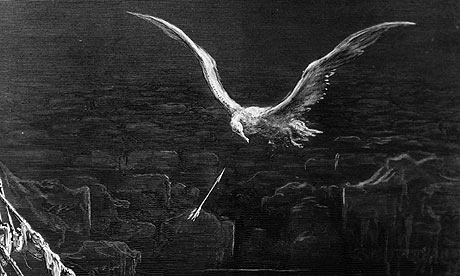
In our recent National Poetry Day poll, Coleridge's ballad,"The Rime of the Ancient Mariner" was enthusiastically mentioned by several posters. It's a poem most people read when young, quickly falling under the powerful spell of its simple ballad metre, its dramatic storytelling and ever-shifting imagery. We're revisiting it this week as All Souls' Night approaches, and autumnal shades are not entirely banished by the commercialised pumpkin-orange and matt-black masquerade of Halloween.
Astonishingly, the poem's spell doesn't seem to weaken over the years. You might criticise the sometimes over-blown declamatory style, the archaic words, or the ghastly invocation of Christian belief at its most judgmental. Certainly, it's easy to agree wholeheartedly with Coleridge's own self-criticism, that there is altogether too much of a pious moral. But the poem exerts its potency every time. The scenery remains thrillingly hellish, while laced with photographically realistic meteorological effects, and the narrative drive is irresistible. Not least of its innovations is that filmic device of cutting, now and again, between the Mariner's urgent button-holing of the wedding-guest, and the tantalising merriment and minstrelsy of the wedding. Like the impatient guest, the reader may want to escape, but is held by the almost deranged insistency of the Mariner's tone.
Coleridge's theme of crime and punishment is so elemental and passionately forged that it seems irrelevant to object that the sin of albatross-shooting is, actually, rather minor, and the horrific punishments disproportionate. The power of the story may well be founded on its symbolic relation to the poet's own sense of worthlessness and impotence, as expressed in a letter to his friend, John Morgan:
"What Crime is there scarcely which has not been included in or followed from the one guilt of taking opium? Not to speak of ingratitude to my maker for the wasted Talents; of ingratitude to so many friends who have loved me I know not why; of barbarous neglect of my family … I have in this one dirty business of Laudanum an hundred times deceived, tricked, nay, actually & consciously LIED. – And yet all these vices are so opposite to my nature, that but for the free-agency-annihilating Poison, I verily believe that I should have suffered myself to be cut in pieces rather than have committed any one of them."
If addiction is the poem's subtext, it helps explain the oddly un-theological plot-strand, in which Death and Life-in-Death throw dice on the spectral ship to decide the fates of the Mariner and his crew. The story Coleridge told of the origins of his addiction in using laudanum as an analgesic for rheumatic pains, points to his own sense of the cruel power of the random. The addiction wasn't chosen: it was a fate visited on him. The poison, once ingested, is "free-agency-annihilating".
The most convincing reading of the poem as "personal allegory" is George Whalley's essay The Mariner and the Albatross. The Mariner, Whalley suggests, is the poet. The albatross is the bringer of the benign south wind that Coleridge associates, in his Anima Poetae, with Genius. In killing the albatross, he has destroyed his gift.
The albatross might equally symbolise social connection. At the start of the poem, the bird visits the ship regularly and is fed by the sailors. We are not told why the Mariner idly decides to kill the bird. Again, the hint is that the random act is the root of the evil. The moment at which the Mariner begins to climb out of his slough of despond is the moment he overcomes his revulsion from the foul sea-snakes and unknowingly, involuntarily, blesses them. These snakes may be associated with the imagery of opium-induced nightmare. Perhaps, in fact, it is by owning up to the imaginative power of the opium vision that the Mariner-Poet redeems his failure.
The following extract comes from Part IV. It includes the glosses which Coleridge added to the 1817 edition of the poem, usually printed as marginalia. This commentary is sometimes merely explanatory (and now seems unnecessary) but it may also shed further psychological light, as in the famous "moon gloss", with which my extract begins.
"In his loneliness and fixedness he yearneth towards the journeying Moon, and the stars that still sojourn, yet still move onward; and every where the blue sky belongs to them, and is their appointed rest, and their native country and their own natural homes, which they enter unannounced, as lords that are certainly expected and yet there is a silent joy at their arrival."
The moving Moon went up the sky,
And no where did abide:
Softly she was going up,
And a star or two beside –
Her beams bemocked the sultry main,
Like April hoar-frost spread;
But where the ship's huge shadow lay,
The charméd water burnt alway
A still and awful red.
"By the light of the Moon he beholdeth God's creatures of the great calm."
Beyond the shadow of the ship,
I watched the water-snakes:
They moved in tracks of shining white,
And when they reared, the elfish light
Fell off in hoary flakes.
Within the shadow of the ship
I watched their rich attire:
Blue, glossy green, and velvet black,
They coiled and swam; and every track
Was a flash of golden fire.
"Their beauty and their happiness.
He blesseth them in his heart."
O happy living things! no tongue
Their beauty might declare:
A spring of love gushed from my heart,
And I blessed them unaware:
Sure my kind saint took pity on me,
And I blessed them unaware.
"The spell begins to break."
The self-same moment I could pray;
And from my neck so free
The Albatross fell off, and sank
Like lead into the sea.

